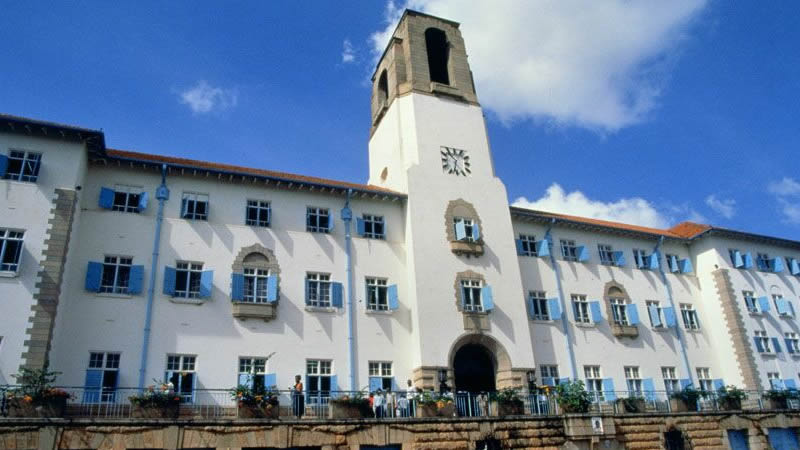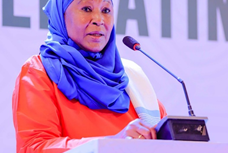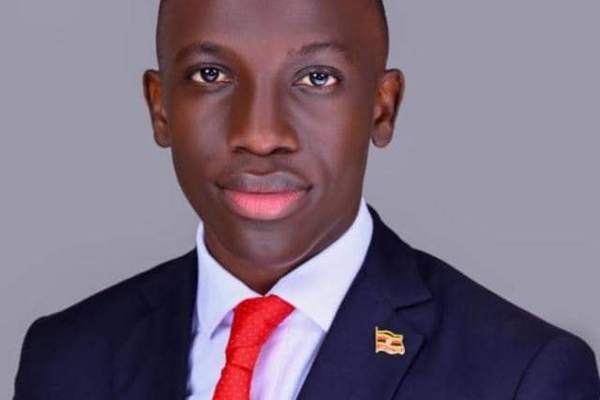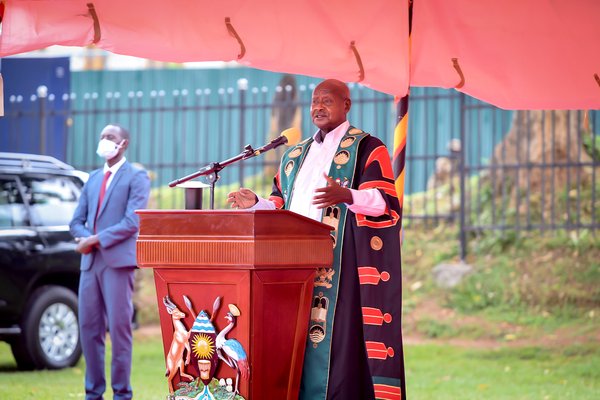By Claire Zerida Balungi
As if to blur the function of all other facilities, the University Swimming Pool comes into focus at the tune of a rainless Saturday night event - Prime Time! The contagious HIV/AIDS edutainment program has gone on for as long as we can remember… students masking the fence and stairs around the swimming pool with hungry eyes and ears. Many, over the years, have not survived the churchy delight of the entertainment and education provided.
Prime Time traces its beginnings from the testimony of its founder, Pr Martin Ssempa. Before 1989 when he joined Makerere University as a student, the party boy and breakdance champion says he met a pretty girl, Tracy (now his wife) who invited him to a student group called the Baptist Student Centre. There, through the teas, debates and camps, his life was transformed and the group geared him towards their mission - to serve the young people. Having lived through the horrid eighties, catching sight of trauma that reared its ugly head through HIV, Ssempa gathered interest in HIV/AIDS activism, and the university being fertile ground for the spread of the virus, Prime Time was without a doubt starting later than it should have.
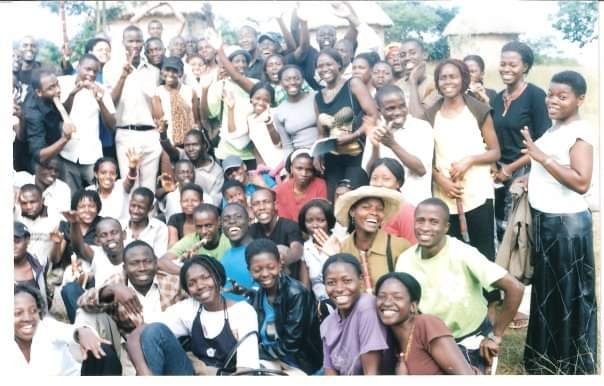
Pioneers of Prime Time at a get-together in 2006
From Saturday Night Jams to Prime Time
In 1997, before it would earn its household name, Prime Time, the weekly rally began with another perky name, SANJAs (Saturday Night Jams) at the St Augustine Student Center. SANJAs worked with students of Lumumba Hall to mobilize other students who came and enjoyed moments of debate and entertainment on controversial subjects.
As time went on, there was a mounting need to magnify the impact of the Saturday proggie as students called it. Campus at the time was awash with sexualized entertainment mixed with alcohol, and a massive effort to get new students (freshers) to visit nightclubs grew around the campus. Ssempa and his boys picked up their gospel and guitars and moved to the Makerere University Swimming Pool which was more open and more inviting to the student community. There was something about the place. Pr Ssempa felt it was just the perfect spot to hold the gathering. It was big enough to host an audience and entertainers, let alone create an ambiance for relaxation. Moreover, it just so happens to be a central place in the University. If you were coming from any hall of residence or the outskirts of the university for Saturday entertainment, the swimming pool was an easy destination.
Becoming Prime Time
Nearly 25 years ago, in 1999, about five men came together to give Prime Time its name; Pr Ssempa, the founder of Makerere Community Church (MCC) which was premised at the College of Veterinary Medicine, and was attended by the other four, Vincent Mubalangu who was a worship leader at MCC, now pastoring a church in Masajja; Pr Micah Rwothumio, now Pastor of University Community Fellowship (UCF) in Kikoni; Eddie Ivan Kaweela who is now a life coach; and Joseph Beyanga, Head of Radio at Nation Media Group. For hours, they racked their brains to birth the name, Prime Time, and to properly plan the content they thought would make it actual prime time for the students. Prime Time partnered with the Sports Department and the Student Guild and the show went on.
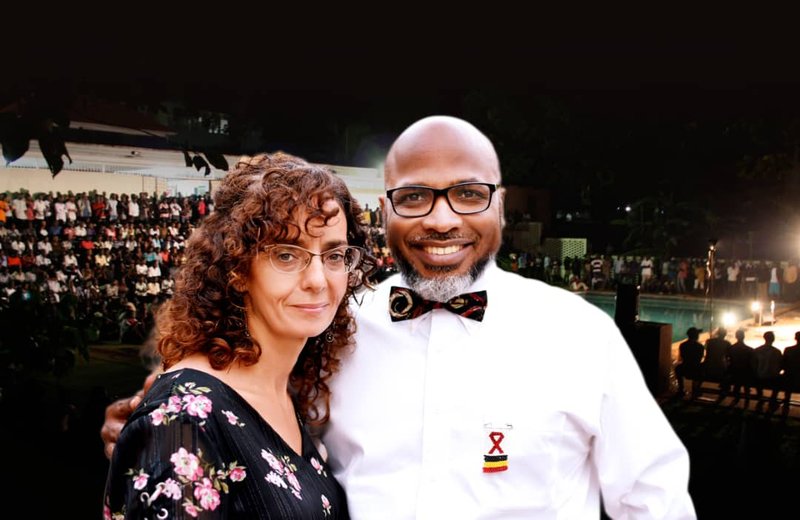
Pastor Martin Ssempa and his wife Tracey, the founders of Prime Time
It would be an evangelical ground that would welcome Christians to have fun, and those who didn’t know about Jesus, to get to know the Saviour. The gospel would be delivered through music, drama, comedy and motivational mentorship for students to succeed academically as well as in the development of character as Beyanga recalls.
For the ordinary student, Prime Time started between 7pm and 8pm, but for Beyanga, who was the DJ, almost producer and event manager of sorts, it started at 2pm. “I never had any other life on Saturday, my life was Prime Time. By then, we used to keep our equipment at what used to be called the White House on Gadaffi Road as you slope down to the Law Development Centre (LDC). We’d come to Wandegeya, hire a truck, go to White House, pick the equipment, come to the swimming pool, set up and then start playing music,” he recalls. Kaweela would do the emceeing most times and Prime Time “was a vibe!”
The make-up of the attendees
Most recently, every Saturday rally, depending on the day, pulls an average audience of 700 to 1,000 students, Pr Ssempa notes. But Prime Time did not start by filling up the stairs at the pool with the audience of students, professors, lecturers and their children, alumni and random outsiders near Makerere, as after about a year. A stream of famous entertainers like musicians, comedians and poets who started to get hosted along the way made all the difference. Ethan Musolini, now CEO of Success Africa, was one of the renowned poets, remembered by the legendary attendees of Prime Time for his famous poem, “To be or not to be” whose title resonates with a Shakespearean soliloquy in the play, Hamlet. Some of the music groups that were the hits of the late 90s and performed at Prime Time were First Love, Heaven-bound and Come Alive.
Household names like George Okudi, famous for his Wipolo song, Wilson Bugembe, Judith Babirye, and later Levixone, among other people in the creative industry, did perform at Prime Time. George Okudi’s performance was one of the highlights of Prime Time’s old days. He was invited to the pool in 2003 after he’d just walked away with two awards at the coveted Kora Awards in South Africa.
As Pr Ssempa recalls, Prime Time became a platform for incubating talent both on and off campus. “We have incubated famous city emcees, like Uncle Mark, Bob Ambrose Nuwagira, O’Jay (Ojangole), Julius Lukwago, Pablo the actor,” he says, adding, “We also invite business leaders like Amos Wekesa, thought leaders in government like Nobert Mao, religious leaders, experts in HIV, people living with HIV, pastors, international musicians, generally people who have something worth sharing.”
The entertainment
The entertainment at Prime Time could not remain the same with the natural order of changing times. It has had to evolve over the years. “What was funny isn’t funny now, who was the hero isn’t the hero today. In my days, we used to have break dance, folk, reggae and hip hop but now, young people’s tastes have changed. They now like Nigerian type of music,” notes Pr Ssempa who takes the trouble to perform informal surveys and strategize on how best to feed the “Prime Timerz”. He’s had to look into the books that youths are reading today, the movies that interest them, musicians whose lyrics and beats are exciting them, and revered influential leaders that young people look up to. These surveys help Prime Time support and communicate best with students on their education journey amidst the cruel struggles of drug abuse, depression, suicide and other mental health issues they deal with.
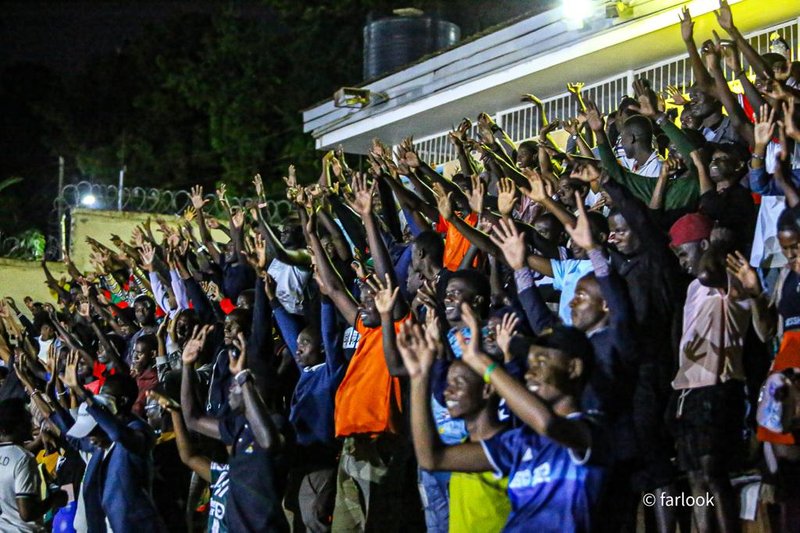
Makerere students cheering Levixone one of the leading gospel artists in Uganda in early 2023
By the end of the night, “the biggest joy was seeing people coming in and accepting Jesus,” says Beyanga. Moses Nuwagaba and his friends had done Prime Time as freshers who had no night plot and initially decided to go get girls at the rally. Their lives were transformed when they got drawn by the ministry and decided to abandon their schemes and give their lives to God. Many alumni, like Christabel Nakyejwe, recall the Prime Timer’s Abstinence Pledge which was basically a covenant with God until one committed to a monogamous marriage. The Pledge kept students pure and sane during their campus days. “When I heard the testimonies about the wild lifestyles from victims of HIV at Prime Time, and how God was the only true source of happiness, I signed the Abstinence Pledge card and internally resolved to keep my promise. I can’t say just how thankful I am to God for guiding me through campus, having witnessed my friends encounter avoidable sexual challenges.”
For Beyanga, Prime Time still did not end when the dancing and preaching stopped. He had to remember his way to Wandegeya on foot as boda bodas and mobile phones “were not easy” at the time. There, he hired a truck again, went back into the university at the pool, repacked the equipment with enthusiasm, pride and sheer youthfulness and off they drove to return it all at Gadaffi Road before he would grab a rolex (an egg rolled in a chapatti) in Wandegeya, a town that certainly never slept, and went to bed at about 1am.
Sacrifice
Organizing Prime Time has been as charging as it has been fun. For the organizers, it is a huge sacrifice and investment to make happen, this behavioural change HIV/AIDS program. They work at raising funds, sacrifice time and offer professional support to the students. Back in the day, they had to pull pennies together to hire the truck that transported their equipment. When the DJ felt the need to advance from playing music off the cassette tape, he saved up and invested in two discmans “to mix the music well”. In the thick of the joys and challenges, Prime Time has played up to Makerere’s motto. It has built for the future.
Prime Time at 25
Next year, Prime Time will be celebrating 25 years of Saturday night laughter, music and memories at the pool. “We would like to have a Prime Time student reunion. I want to gather 25 years of change probably every 10 years, we can say from 1999 to 2009, from 2009 to 2019, something like that. We want strategic partners like the university to partner with us, even former Prime Timerz who have benefited, it would be great if our alumni supported us in getting equipment like sound systems and a van to take students home after the rally as it is not secure for students who live outside the university to walk back home past midnight when we close sometimes. We are also asking the university to recognize the Born-Agains as a religion and allow the Makerere Community Church space to operate again in the institution so that we can put in more effort in organizing Prime Time which we shall use as a vehicle in delivering social vaccines and mentorship for the whole university,” Pr Ssempa concludes.
Related News
![]() Please join hands with the Makerere University Endowment Fund as it works towards attracting & retaining the best faculty, providing scholarships, and investing in cutting-edge research and technology.
Please join hands with the Makerere University Endowment Fund as it works towards attracting & retaining the best faculty, providing scholarships, and investing in cutting-edge research and technology.
